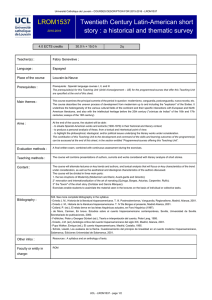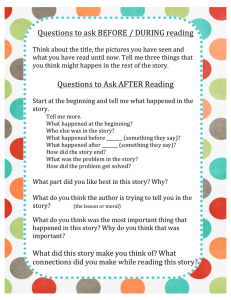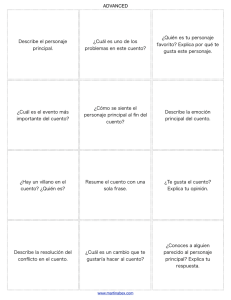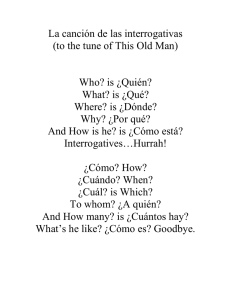HOW TO READ WITH CHILDREN: WHAT READING EXPERTS SAY
Anuncio
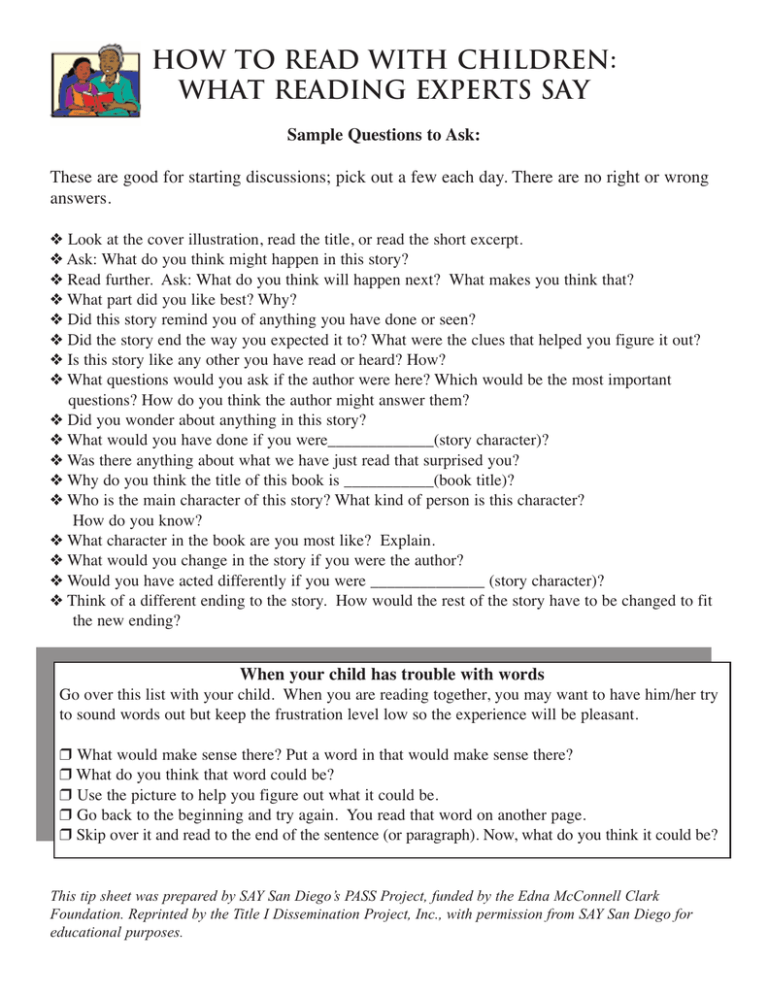
How to Read with Children: What Reading Experts Say Sample Questions to Ask: These are good for starting discussions; pick out a few each day. There are no right or wrong answers. ❖ Look at the cover illustration, read the title, or read the short excerpt. ❖ Ask: What do you think might happen in this story? ❖ Read further. Ask: What do you think will happen next? What makes you think that? ❖ What part did you like best? Why? ❖ Did this story remind you of anything you have done or seen? ❖ Did the story end the way you expected it to? What were the clues that helped you figure it out? ❖ Is this story like any other you have read or heard? How? ❖ What questions would you ask if the author were here? Which would be the most important questions? How do you think the author might answer them? ❖ Did you wonder about anything in this story? ❖ What would you have done if you were_____________(story character)? ❖ Was there anything about what we have just read that surprised you? ❖ Why do you think the title of this book is ___________(book title)? ❖ Who is the main character of this story? What kind of person is this character? How do you know? ❖ What character in the book are you most like? Explain. ❖ What would you change in the story if you were the author? ❖ Would you have acted differently if you were ______________ (story character)? ❖ Think of a different ending to the story. How would the rest of the story have to be changed to fit the new ending? When your child has trouble with words Go over this list with your child. When you are reading together, you may want to have him/her try to sound words out but keep the frustration level low so the experience will be pleasant. ❒ What would make sense there? Put a word in that would make sense there? ❒ What do you think that word could be? ❒ Use the picture to help you figure out what it could be. ❒ Go back to the beginning and try again. You read that word on another page. ❒ Skip over it and read to the end of the sentence (or paragraph). Now, what do you think it could be? This tip sheet was prepared by SAY San Diego’s PASS Project, funded by the Edna McConnell Clark Foundation. Reprinted by the Title I Dissemination Project, Inc., with permission from SAY San Diego for educational purposes. Cómo Leer con Niños: Lo Que Dicen los Expertos Muestra de Preguntas para Hacer Estas preguntas son útiles para empezar discusiones; no hay respuestas correctas ni incorrectas; escoja una de las preguntas cada día. ❖ Mire la ilustración de la chaqueta del libro, lea el título o lea el corto resumen. ❖ Pregunte: ¿Qué piensas que pasara en el cuento? ❖ Sigue leyendo. Pregunte: ¿Qué pasara luego? ¿Por qué piensas así? ❖ ¿Qué sobresaltó en este cuento? ❖ ¿Qué parte del cuento te gustó más? ¿Por qué? ❖ ¿Reconociste algo familiar en el cuento que hubieras hecho o visto antes? ❖ ¿Terminó el cuento en la manera que habías esperado? ¿Cuáles pistas le ayudaron resolverlo? ❖ ¿Es este cuento como cualquier otro cuento has leido o oido? ¿Cómo? ❖ ¿Qué preguntas harías si el autor estuviera aquí? ¿Cuáles serían las preguntas más importantes? ¿Cómo respondería el autor a las preguntas? ❖ ¿Te preguntaste de algo en el cuento? ❖ ¿Qué habrías hecho si fueras __________________ (un personaje del cuento) ❖ ¿Había algo que leíste que te sorprendio? ❖ ¿Qué opinas del titulo del libro? ❖ ¿Quién es el personaje principal del cuento? ¿Qué clase de persona es este personaje? ¿Cómo sabes? ❖ ¿Cuál personaje del libro se parece más a ti? Explique. ❖ ¿Qué cosas del cuento cambiarías si fueras el autor? ❖ ¿Habrías actuado de una manera diferente si fueras _________________ (un personaje del cuento)? ❖ Imagínate el fin del cuento diferente. ¿Cómo cambiaría el resto del cuento para convenir el fin del cuento nuevo? Cuando tu Niño Tenga Problemas con Palabras Repase esta lista con su niño. Cuando lean juntos, dele la oportunidad de a su hijo de pronunciar sonidos de las palabras pero mantenga un bajo nivel de frustración y haz la experiencia agradable. ❒ ¿Qué sería mejor aquí? Use una palabra que estaría de acuerdo con el concepto de la oración. ❒ ¿Cuál palabra sería? ❒ Use las fotos o dibujas para ayudar comprender cual sería la mejor palabra. ❒ Regrese al principio del cuento y intente otra vez. Lea esa palabra en otra página. ❒ Pásela y lea hasta al fin de la oración o párrafo. Ahora, ¿que piensas, que podría ser? El Proyecto PASS de SAY San Diego, fundado por la fundación Edna McConnell Clark
